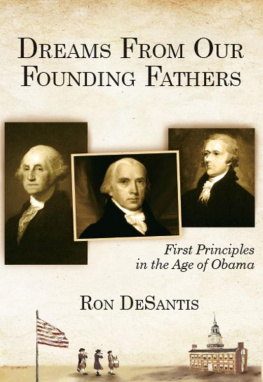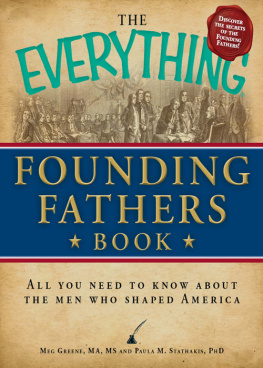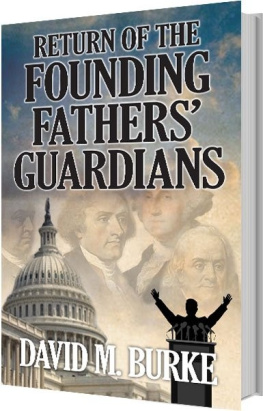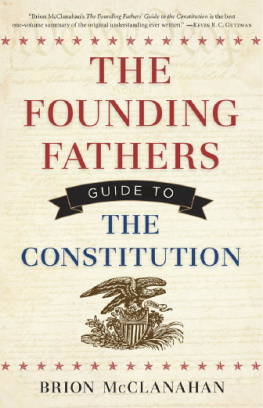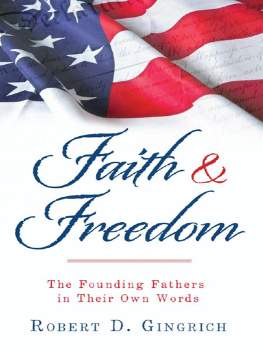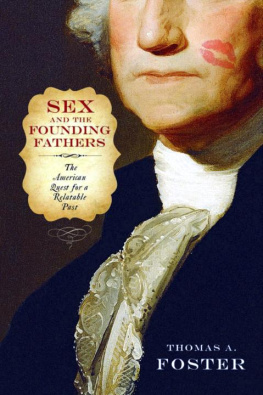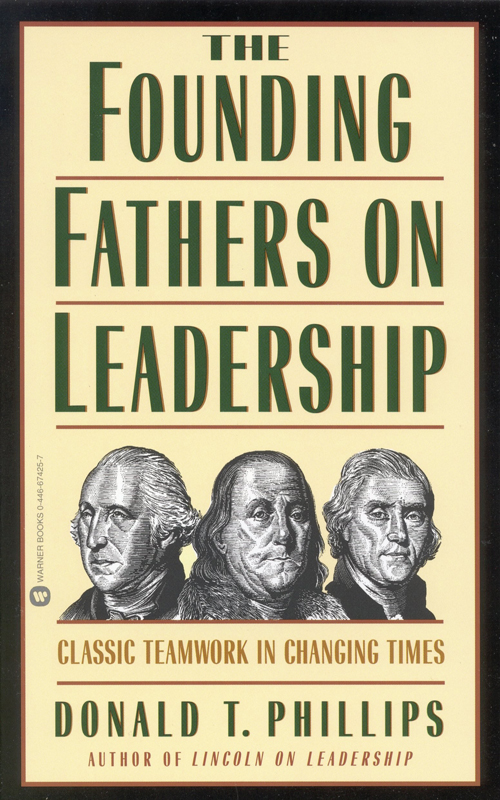THE FOUNDING FATHERS ON LEADERSHIP.Copyright 1997 by Donald T. Phillips.All rights reserved. No part of this book may be reproduced in any form or by any electronic or mechanical means, including information storage and retrieval systems, without permission in writing from the publisher, except by a reviewer who may quote brief passages in a review.
ON LEADERSHIP is a trademark of Donald T. Phillips.
Warner Books,
Hachette Book Group
237 Park Avenue
New York, NY 10017
ISBN: 978-0-7595-2420-0
A hardcover edition of this book was published in 1997 by Warner Books.
First eBook Edition: May 2001
Visit our website at www.HachetteBookGroup.com.
Lincoln on Leadership: Executive Strategies for Tough Times
On the Brink: The Life and Leadership of Norman Brinker
(with Norman Brinker)
Lincoln Stories for Leaders
Wise statesmen as they were, they knew the tendency of prosperity to breed tyrants, and so they established these great self-evident truths, that when in the distant future some man, some faction, some interest, should set up the doctrine that none but rich men, or none but white men, were entitled to life, liberty and the pursuit of happiness, their posterity might look up again to the Declaration of Independence so that truth, and justice, and mercy, and all the humane and Christian virtues might not be extinguished from the land.
Abraham Lincoln,
on the founding fathers,
August 17, 1858
A free-born people are not required to submit to tyranny!
Citizens of Marlborough,
Massachusetts, 1774
I t was a time of great change. A time when one thing was on the way out and another on the way in.
Old and current value systems were being challenged. For centuries, people the world over had been oppressed through tyrannical monarchies and dictatorships. There were no forms of government on earth that guaranteed, or even advocated rights for the individuallet alone freedom itself.
There was anxiety among the masses, with much dissent and dissatisfaction. There was fear of the unknownand yet a strong desire for something better. On one hand, people wanted change. On the other, they resisted it when it hit too close to home. There was comfort in the old ways.
Dissent soon turned to action by way of passionate civil disobedience. And, finally, civil disobedience itself metamorphosed into full-scale revolution.
But the period surrounding the American Revolution was also a time of tremendous creativity and innovation. There were no precedents for what was about to happen.
Clearly, something was waiting to be born.
* * *
The spark of a fire that would eventually burn around the world began in the so-called New Worldin the thirteen American colonies, most of which were formed in the seventeenth century by people seeking a better life than they had experienced in Europe. By the mid-eighteenth century, all the colonies had become members of the British empire. Due to geographic location, along with the wisdom of old King George II, Americans were pretty much allowed to run their own affairs.
Philadelphia, with a population of 34,000, was the largest city in America and second largest in the overseas British empire. New York had a population of 22,000 in the north and, in the south, Charleston, with approximately 10,000 people, was the chief port of economic activity. Because Americans were prolific producers of goods, they had a dynamic and prosperous economy. As a matter of fact, America was famous for its ragged currencyso named because it changed hands frequently.
American autonomy, however, was significantly disrupted when, at the age of twenty-two, George III ascended to the throne of Great Britain in 1760. Not as wise or benevolent as his grandfather, the new King immediately set out to establish his power and influence over the Americans. His mental attitude and initial actions were like those of a modern tyrannical boss who arrives to run a new organizationwith no respect for the culture or individuals that are already in place. Worse yet, the youthful George III attempted to impose his will and personal values on a proud and fiercely independent people.
One of the empires first moves against the colonies was to establish the Revenue Act of 1764 (better known as the Sugar Act), which imposed a duty on American imports of molasses as well as limiting distribution from the West Indies to America. The effect on American production of distilled whiskey and rum was devastating. Massachusetts, Rhode Island, New York, and Pennsylvania immediately united and sent out numerous protestations to Londonall of which fell on deaf ears. While Americans never did like being told what to doand usually ignored previous edicts or ordersGreat Britain was now threatening their very livelihood. And that was a different matter altogether.
On August 14, 1764, an effigy was hung from an elm tree in Bostons Hanover Square. Beside it was a large black boot with a devil crawling out of the opening (symbolizing the Earl of Bute, an unpopular British official). The Liberty Tree, as it soon came to be known, became a gathering point for dissident, sometimes riotous Americans. And beating the effigy or the boot was symbolic of striking a blow for freedom.
As tempers and passions began to rise, the American people became something of a volcano waiting to erupt. Just one major quake was necessary to set them off. And Great Britain provided that catalyst with imposition of a series of new oppressive government decrees.
The Quartering Act of 1765, for example, permitted the quartering of British troops in private residences without the permission of homeowners (which gave a hint of future British plans). But it was the Stamp Act of that same year that really caused a major crisis. The creation of this new tax (requiring stamps purchased from the British government be placed on nearly all publicly sold documents) incited immediate and spontaneous riots across the colonies. Poor people were thrown out of work because their employers could not afford to pay both them and the government. As a result, British officials were seized and beaten by American citizens and the slogan No taxation without representation was heard all across the land.
Great Britain was equally defiant toward the American upstarts. After repealing the Stamp Act in 1766, the government added the Declaratory Act, which proclaimed Parliaments supreme power over the colonies in both legislation and taxation. And then, in 1767, the royal government implemented the Townshend Actsa series of external taxes levied on imports from England. More important, however, was the fact that these new decrees subtly provided for all economic controls to pass from local government authority to handpicked representatives of the British Crown. Unauthorized warrants and seizures were now sanctioned and, with time, American fiscal affairs were to be controlled by Great Britain.
At first the Townshend Acts did not create a great deal of reaction. And, certainly, there was no organized revolutionary movement in America. Gradually and steadily, however, a determination to resist British authority grew among businessmen, merchants, skilled professionals, and astute southern plantation owners.
In April 1768, after John Hancock defiantly prevented an inspection of one of his cargo ships, the British government filed criminal charges against him. This was not an act that went unnoticed, because Hancock was one of Bostons wealthiest and most influential businessmen. Even though the charges were eventually dropped, individual disobedience of British law became more and more common.




